Be动词、介词、
- 格式:doc
- 大小:495.50 KB
- 文档页数:7
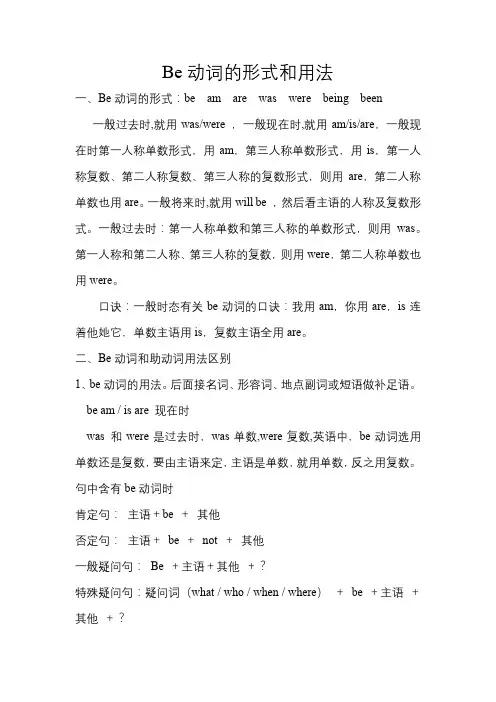
Be动词的形式和用法一、Be动词的形式:be am are was were being been一般过去时,就用was/were ,一般现在时,就用am/is/are,一般现在时第一人称单数形式,用am,第三人称单数形式,用is,第一人称复数、第二人称复数、第三人称的复数形式,则用are,第二人称单数也用are。
一般将来时,就用will be ,然后看主语的人称及复数形式。
一般过去时:第一人称单数和第三人称的单数形式,则用was。
第一人称和第二人称、第三人称的复数,则用were,第二人称单数也用were。
口诀:一般时态有关be动词的口诀:我用am,你用are,is连着他她它,单数主语用is,复数主语全用are。
二、Be动词和助动词用法区别1、be动词的用法。
后面接名词、形容词、地点副词或短语做补足语。
be am / is are 现在时was 和were是过去时,was单数,were复数,英语中,be动词选用单数还是复数,要由主语来定,主语是单数,就用单数,反之用复数。
句中含有be动词时肯定句:主语+be +其他否定句:主语+be +not +其他一般疑问句:Be +主语+其他+?特殊疑问句:疑问词(what / who / when / where)+be +主语+其他+?如:I am a teacher.You are right.She is 16 years old.My father is at home.The students are playing games.My teacher was ill yesterday.There is a picture on the wall.There are two books on the table.be动词用法歌:我用am,你用are,is 连接他她它。
单数名词用is,复数名词全用are。
变疑问,往前提,句末问号莫丢弃;变否定,更容易,be后not莫忘记;疑问否定任你变,句首大写莫迟疑。
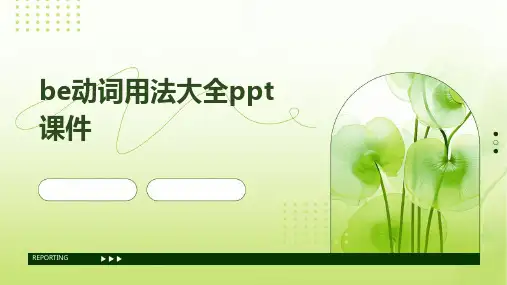

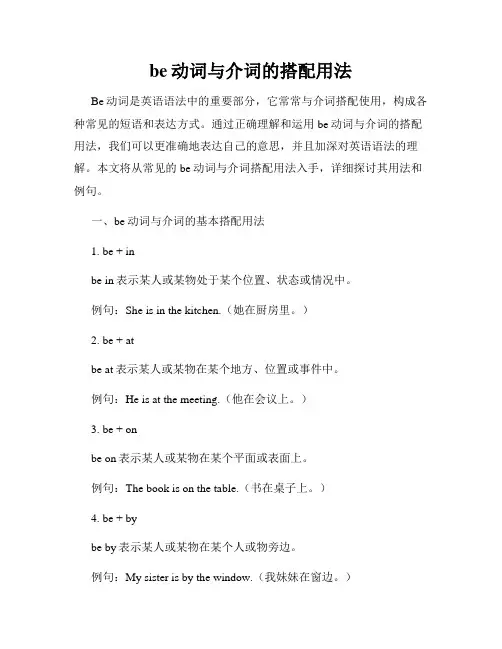
be动词与介词的搭配用法Be动词是英语语法中的重要部分,它常常与介词搭配使用,构成各种常见的短语和表达方式。
通过正确理解和运用be动词与介词的搭配用法,我们可以更准确地表达自己的意思,并且加深对英语语法的理解。
本文将从常见的be动词与介词搭配用法入手,详细探讨其用法和例句。
一、be动词与介词的基本搭配用法1. be + inbe in表示某人或某物处于某个位置、状态或情况中。
例句:She is in the kitchen.(她在厨房里。
)2. be + atbe at表示某人或某物在某个地方、位置或事件中。
例句:He is at the meeting.(他在会议上。
)3. be + onbe on表示某人或某物在某个平面或表面上。
例句:The book is on the table.(书在桌子上。
)4. be + bybe by表示某人或某物在某个人或物旁边。
例句:My sister is by the window.(我妹妹在窗边。
)5. be + withbe with表示某人和另外一个人在一起。
例句:I am with my friends.(我和我的朋友在一起。
)6. be + forbe for表示某事物或某人是为了某个目的或目标而存在或使用的。
例句:This book is for children.(这本书是给孩子们的。
)7. be + ofbe of表示某人或某物具有某种特征、性质或归属关系。
例句:The cup is made of glass.(杯子是由玻璃制成的。
)8. be + frombe from表示某人或某物来自某个地方或国家。
例句:She is from France.(她来自法国。
)二、be动词与介词的常见短语搭配1. be good atbe good at表示某人在某个领域或技能上很擅长。
例句:She is good at playing the piano.(她擅长弹钢琴。
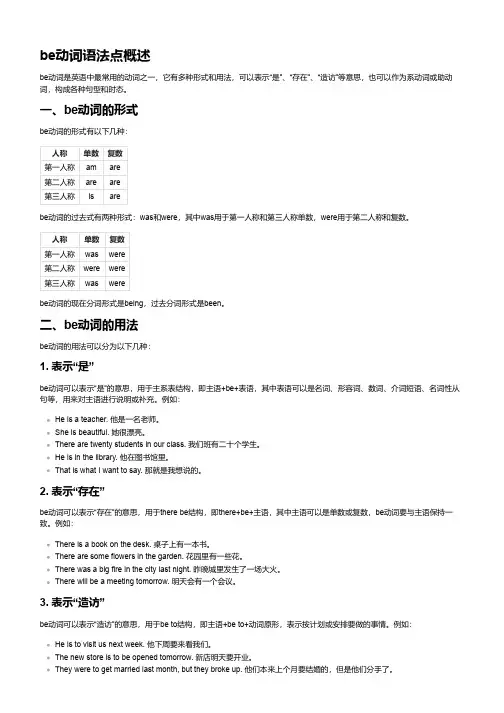
be动词语法点概述be动词是英语中最常用的动词之一,它有多种形式和用法,可以表示“是”、“存在”、“造访”等意思,也可以作为系动词或助动词,构成各种句型和时态。
一、be动词的形式be动词的形式有以下几种:人称单数复数第一人称am are第二人称are are第三人称is arebe动词的过去式有两种形式:was和were,其中was用于第一人称和第三人称单数,were用于第二人称和复数。
人称单数复数第一人称was were第二人称were were第三人称was werebe动词的现在分词形式是being,过去分词形式是been。
二、be动词的用法be动词的用法可以分为以下几种:1. 表示“是”be动词可以表示“是”的意思,用于主系表结构,即主语+be+表语,其中表语可以是名词、形容词、数词、介词短语、名词性从句等,用来对主语进行说明或补充。
例如:He is a teacher. 他是一名老师。
She is beautiful. 她很漂亮。
There are twenty students in our class. 我们班有二十个学生。
He is in the library. 他在图书馆里。
That is what I want to say. 那就是我想说的。
2. 表示“存在”be动词可以表示“存在”的意思,用于there be结构,即there+be+主语,其中主语可以是单数或复数,be动词要与主语保持一致。
例如:There is a book on the desk. 桌子上有一本书。
There are some flowers in the garden. 花园里有一些花。
There was a big fire in the city last night. 昨晚城里发生了一场大火。
There will be a meeting tomorrow. 明天会有一个会议。
3. 表示“造访”be动词可以表示“造访”的意思,用于be to结构,即主语+be to+动词原形,表示按计划或安排要做的事情。
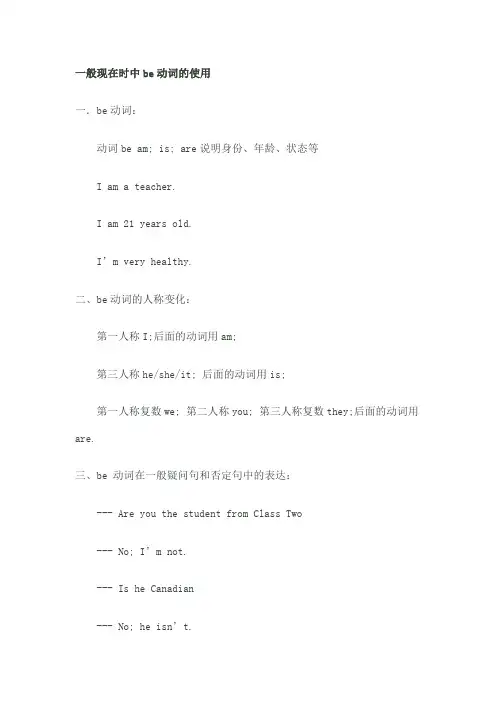
一般现在时中be动词的使用一.be动词:动词be am; is; are说明身份、年龄、状态等I am a teacher.I am 21 years old.I’m very healthy.二、be动词的人称变化:第一人称I;后面的动词用am;第三人称he/she/it; 后面的动词用is;第一人称复数we; 第二人称you; 第三人称复数they;后面的动词用are.三、be 动词在一般疑问句和否定句中的表达:--- Are you the student from Class Two--- No; I’m not.--- Is he Canadian--- No; he isn’t.--- Are they fond of pop music--- No; they aren’t.从上面例句中可看出;动词be一般现在时的一般疑问句中把be提到句首;它的否定句式是在be后直接加not..四、be 动词的具体使用:1.be + 形容词I’m very tire d.He is handsome and smart.The vegetables are fresh.It’s hot today.The traffic is always heavy.The book is interesting.My trip to Paris is exciting.Their opinion is different from mine.She is kind enough to help me out.My room is rather small.The stories in the book are scary.Sue and Sam are friendly to me.2. be + 名词They are my close friends.She is a nice girl.They are baseball players.That’s a good idea.Moscow is a busy city.They aren’t my notebooks.I am a patient teacher.Cindy is a housewife.Jake is an engineer.Both of her parents are scientists.3. be + 介词短语The flowers are in the vase.She is at home now.Are they from RussiaThe teacher and the students are in the classroom.Mark is in front of the room.4. be + 形容词短语My holiday is long enough.They are tired and hot.5. be +副词The game is over.I’m home.They are abroad.What’s upTime is up.She will be around here.6. 用于表示时间:Today is Sunday.The next match will be at 7.The following holiday is National Day.The business hour is from 9 a.m. to 6 p.m.7. 用于现在进行时:Peter is running in the heavy rain.We are leaving here next Monday.I’m coming to see you.They are taking notes in class.练习:一、阅读下面短文并回答问题:Robert BrownRobert Brown is a student. He is from Italy. He is 21 years old. He studies English every day. Peter is his teacher. Peter is a good teacher. He is kind and patient. Robert and Peter are in the classroom now. They are busy. Peter is at the board. Robert is at his desk. Robert likes his classroom. It is a small room. It is clean and pleasant. The classroom is in a large building.一用完整句子回答问题:e.g. —Is Robert a student —No; he isn’t a student.1. Is Peter a good teacher2. Are Robert and Peter in the classroom now3. Are they busy4. Is Robert at the board5. Is Peter near the window6. Is the classroom in a small building7. Is it a small room8. Where is Robert from9. How old is Robert10. Where are Robert and Peter now二用动词is和are填空:Robert Brown _________ a student. He is from Italy. He ________ 21 years old. He studies English every day. Peter__________ his teacher. Peter ________ a good teacher. He __________kind and patient. Robert and Peter ___________ in the classroom now. They ___________ busy. Peter _____________ at the board. Robert __________ at his desk. Robert likes his classroom. It ________ a small room. It __________ clean and pleasant. The classroom_____________ in a large building.二、用动词am; is; are完成下列句子:1. Jenny ___________ a good-looking girl.2. My friends ___________ in the library now.3. Pairs ___________ beautiful at night.4. Her hometown ____________ a small village.5. _______ you from Italy6. They __________ interested in history.7. The Summer Camp _______ exciting.8. ____________ Judy at home9. Tony’s parents _____________ patient and thoughtful.10. The car ___________in the garage now.11. My mother and I ____________ fond of light music.12. My neighbors ___________ kind to me.13. Math __________ difficult for me to learn well.14. Those chairs ________ not comfortable.15. She __________ shy and silent.16. The bookstore and the cinema ________ on the left.17. Class ___________ over.18. The leaves __________ brown in autumn.19. His hobby _________ playing tennis.20. They ________ twin sisters.21. The dictionary ________ English-English dictionary.22. Her job _______to clean the floor.23. His hair __________ curly and fair24. The Canadian teachers __________ in the meeting hall.25. They __________ different pictures.26. The air in the room ______ clean.27. I________ never late for class.28. The dining hall ___________next to the school gate.29. Her speech __________ successful.30. The trip ___________ safe and interesting.。
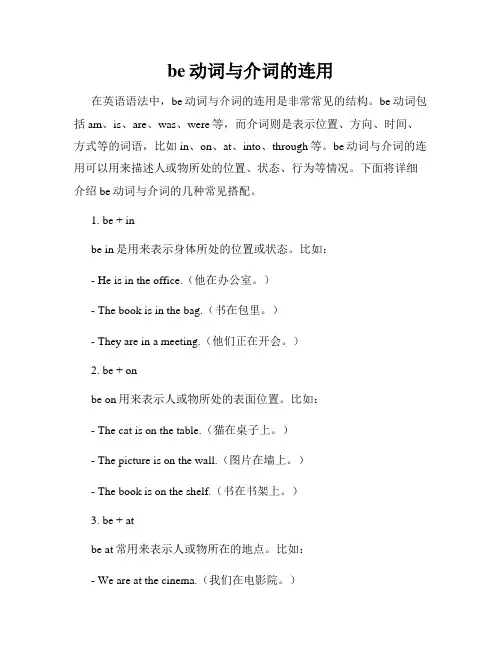
be动词与介词的连用在英语语法中,be动词与介词的连用是非常常见的结构。
be动词包括am、is、are、was、were等,而介词则是表示位置、方向、时间、方式等的词语,比如in、on、at、into、through等。
be动词与介词的连用可以用来描述人或物所处的位置、状态、行为等情况。
下面将详细介绍be动词与介词的几种常见搭配。
1. be + inbe in是用来表示身体所处的位置或状态。
比如:- He is in the office.(他在办公室。
)- The book is in the bag.(书在包里。
)- They are in a meeting.(他们正在开会。
)2. be + onbe on用来表示人或物所处的表面位置。
比如:- The cat is on the table.(猫在桌子上。
)- The picture is on the wall.(图片在墙上。
)- The book is on the shelf.(书在书架上。
)3. be + atbe at常用来表示人或物所在的地点。
比如:- We are at the cinema.(我们在电影院。
)- The party is at John's house.(聚会在约翰家。
)- She is at work.(她在工作。
)4. be + withbe with表达的是人与人之间的关系。
比如:- I am with my friends.(我和我的朋友们在一起。
)- She is with her family.(她和她的家人在一起。
)5. be + bybe by表示被动的状态或位于某个位置。
比如:- The book is by the bed.(书在床边。
)- The car was damaged by an accident.(车子被一次事故损坏了。
)6. be + frombe from表示某人或某物的来源。
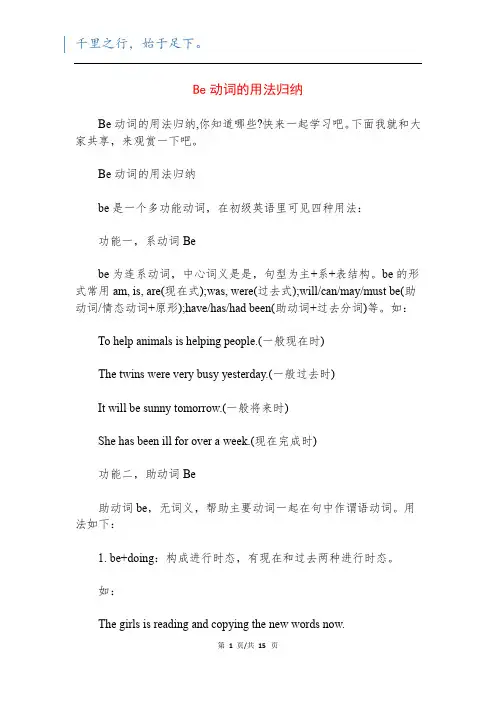
Be动词的用法归纳Be动词的用法归纳,你知道哪些?快来一起学习吧。
下面我就和大家共享,来观赏一下吧。
Be动词的用法归纳be是一个多功能动词,在初级英语里可见四种用法:功能一,系动词Bebe为连系动词,中心词义是是,句型为主+系+表结构。
be的形式常用am, is, are(现在式);was, were(过去式);will/can/may/must be(助动词/情态动词+原形);have/has/had been(助动词+过去分词)等。
如:To help animals is helping people.(一般现在时)The twins were very busy yesterday.(一般过去时)It will be sunny tomorrow.(一般将来时)She has been ill for over a week.(现在完成时)功能二,助动词Be助动词be,无词义,帮助主要动词一起在句中作谓语动词。
用法如下:1. be+doing:构成进行时态,有现在和过去两种进行时态。
如:The girls is reading and copying the new words now.Young Tom was always asking questions and trying out new ideas.2. be+done:构成被动语态(主语是动作的承受者,done必需是及物动词)。
如:Tea is grown in my hometown.(一般现在时的被动语态)This building was built three years ago.(一般过去时的被动语态)Our classroom has been cleaned and tidied already.(现在完成时的被动语态)How could this kind of cakes be made in your home?(含情态动词的被动语态)That is a day never to be forgotten.(动词不定式的被动语态)3. be+going to do,表示准备或将要做某事,be有现在和过去两种形式。
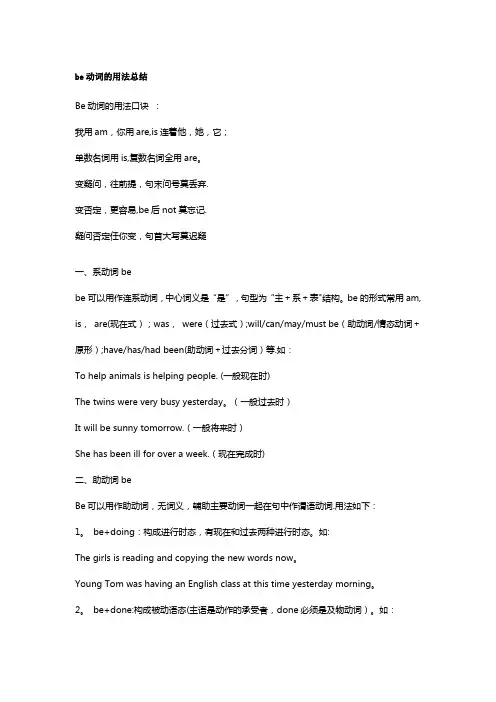
be动词的用法总结Be动词的用法口诀:我用am,你用are,is连着他,她,它;单数名词用is,复数名词全用are。
变疑问,往前提,句末问号莫丢弃.变否定,更容易,be后not莫忘记.疑问否定任你变,句首大写莫迟疑一、系动词bebe可以用作连系动词,中心词义是“是”,句型为“主+系+表"结构。
be的形式常用am, is,are(现在式);was,were(过去式);will/can/may/must be(助动词/情态动词+原形);have/has/had been(助动词+过去分词)等.如:To help animals is helping people. (一般现在时)The twins were very busy yesterday。
(一般过去时)It will be sunny tomorrow.(一般将来时)She has been ill for over a week.(现在完成时)二、助动词beBe可以用作助动词,无词义,辅助主要动词一起在句中作谓语动词.用法如下:1。
be+doing:构成进行时态,有现在和过去两种进行时态。
如:The girls is reading and copying the new words now。
Young Tom was having an English class at this time yesterday morning。
2。
be+done:构成被动语态(主语是动作的承受者,done必须是及物动词)。
如:Tea is grown in my hometown。
(一般现在时的被动语态)This building was built three years ago.(一般过去时的被动语态)Our classroom has been cleaned and tidied already.(现在完成时的被动语态)How could this kind of cakes be made in your home?(含情态动词的被动语态)That is a day never to be forgotten.(动词不定式的被动语态)3。
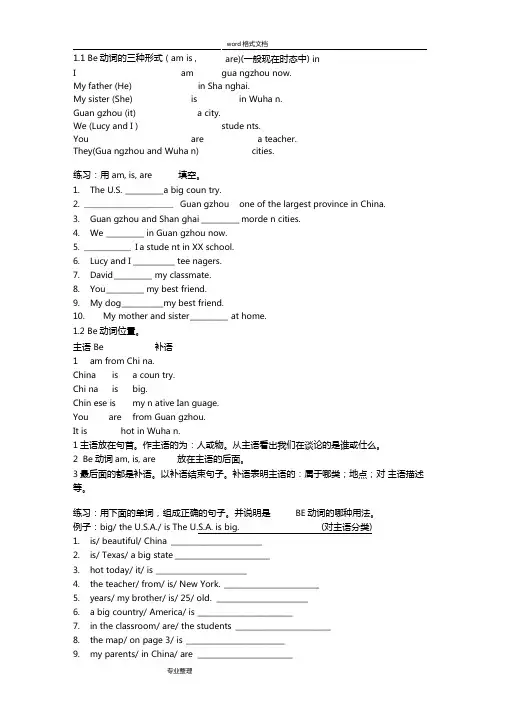
1.The U.S. __________ a big coun try.2.___________________ Guan gzhou one of the largest province in China.3.Guan gzhou and Shan ghai __________ morde n cities.4.We __________ in Guan gzhou now.5.__________ I a stude nt in XX school.6.Lucy and I ___________ tee nagers.7.David __________ my classmate.8.You __________ my best friend.9.My dog ___________ m y best friend.10.My mother and sister __________ at home.1.2 Be动词位置。
主语Be 补语1am from Chi na.China is a coun try.Chi na is big.Chin ese is my n ative Ian guage.You are from Guan gzhou.It is hot in Wuha n.1主语放在句首。
作主语的为:人或物。
从主语看出我们在谈论的是谁或仕么。
2Be动词am, is, are 放在主语的后面。
3最后面的都是补语。
以补语结束句子。
补语表明主语的:属于哪类;地点;对主语描述等。
练习:用下面的单词,组成正确的句子。
并说明是BE动词的哪种用法。
例子:big/ the U.S.A./ is The U.S.A. is big. (对主语分类)1.is/ beautiful/ China ________________________2.is/ Texas/ a big state _________________________3.hot today/ it/ is ________________________4.the teacher/ from/ is/ New York. _________________________5.years/ my brother/ is/ 25/ old. ________________________6. a big country/ America/ is _________________________7.in the classroom/ are/ the students _________________________8.the map/ on page 3/ is __________________________9.my parents/ in China/ are _________________________10.am/ I/ a student __________________________1.3主语与人称代词 Beijing is big. My friend and I are in Guangzhou.It is in the North. Weare in Guangzhou. My sisiter is a stude nt. My cousins are in Sha nghai. She is very happy. They are in Sha nghai. My father is at work. China and Korea are coun tries.He is busy.They are in Asia.You are my teacher.Mr Gao and you are my teachers. You are my teachers.1主语可以是人称代词。
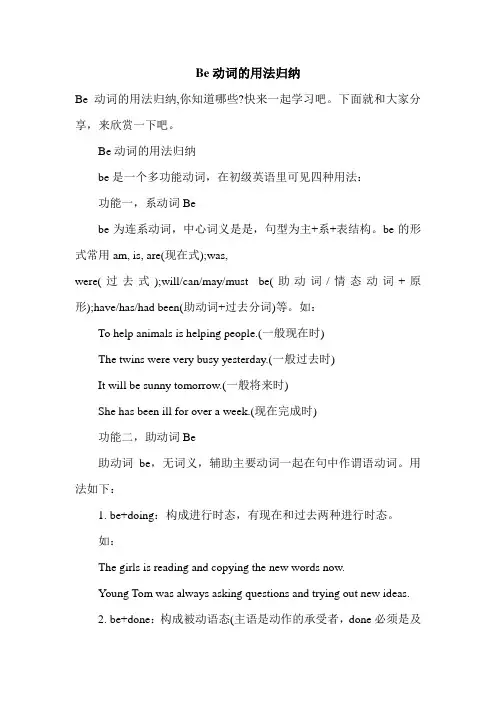
Be动词的用法归纳Be动词的用法归纳,你知道哪些?快来一起学习吧。
下面就和大家分享,来欣赏一下吧。
Be动词的用法归纳be是一个多功能动词,在初级英语里可见四种用法:功能一,系动词Bebe为连系动词,中心词义是是,句型为主+系+表结构。
be的形式常用am, is, are(现在式);was,were(过去式);will/can/may/must be(助动词/情态动词+原形);have/has/had been(助动词+过去分词)等。
如:To help animals is helping people.(一般现在时)The twins were very busy yesterday.(一般过去时)It will be sunny tomorrow.(一般将来时)She has been ill for over a week.(现在完成时)功能二,助动词Be助动词be,无词义,辅助主要动词一起在句中作谓语动词。
用法如下:1. be+doing:构成进行时态,有现在和过去两种进行时态。
如:The girls is reading and copying the new words now.Young Tom was always asking questions and trying out new ideas.2. be+done:构成被动语态(主语是动作的承受者,done必须是及物动词)。
如:Tea is grown in my hometown.(一般现在时的被动语态)This building was built three years ago.(一般过去时的被动语态)Our classroom has been cleaned and tidied already.(现在完成时的被动语态)How could this kind of cakes be made in your home?(含情态动词的被动语态)That is a day never to be forgotten.(动词不定式的被动语态)3. be+going to do,表示打算或将要做某事,be有现在和过去两种形式。
be动词讲解be动词是英语中最常用的动词之一,它用来表示主语的状态、性质、身份、职业、国籍等。
在句子中,be动词通常用于连接主语和表语,构成谓语部分。
本文将以标题为中心,详细讲解be动词的用法及相关知识。
一、be动词的基本形式及时态变化be动词的基本形式有三个:am, is, are。
其中,am用于第一人称单数(I),is用于第三人称单数(he, she, it),are用于第一人称复数(we)和第三人称复数(they)。
be动词的时态变化非常简单,只需在be动词后面加上相应的动词形式即可。
例如,现在进行时的句子结构为:主语+ am/is/are + 现在分词。
二、be动词的用法1. 表示身份、性质和状态be动词常用于表达人或物的身份、性质和状态。
例如:- He is a doctor.(他是一名医生。
)- The sky is blue.(天空是蓝色的。
)- They are happy.(他们很开心。
)2. 表示位置和存在be动词也可用于表示人或物的位置和存在。
例如:- The book is on the table.(书在桌子上。
)- There is a cat in the garden.(花园里有一只猫。
)3. 表示时间和日期be动词还可以用来表示时间和日期。
例如:- It is 8 o'clock.(现在是8点。
)- Today is Monday.(今天是星期一。
)4. 表示习惯和经验be动词可以用于表示习惯和经验。
例如:- She is always late for class.(她上课总是迟到。
)- They are good at playing basketball.(他们擅长打篮球。
)5. 表示被动语态be动词也可以用于构成被动语态。
被动语态的结构为:主语+ am/is/are + 过去分词。
例如:- The book is written by him.(这本书是他写的。
主题:be+过去分词+介词结构用法文章内容:1. 介绍be+过去分词+介词结构的基本用法- be动词包括am, is, are, was, were等,它们与过去分词和介词搭配使用,表示被动语态或状态转移。
- 这种结构通常用来描述物体或人是如何被某种行为或状态所影响或作用的。
2. be+过去分词+介词结构表示被动语态- 例如:The book is written by the famous author.(这本书是由著名作家写的。
)- 这里的is是be动词,written是过去分词,by是介词,表示书是被著名作家写的,表达了被动的意义。
3. be+过去分词+介词结构表示状态转移- 例如:The door is opened by someone.(门被某人打开了。
) - 这里的is是be动词,opened是过去分词,by是介词,表示门的状态是被某人打开了。
4. be+过去分词+介词结构的否定形式- 否定形式是在be动词后面加上not,表示否定意义,例如:Thewindow is not closed.(窗子没有关上。
)5. be+过去分词+介词结构的一般疑问句- 一般疑问句是将be动词调到句首,例如:Is the homework finished by him?(作业被他完成了吗?)- 这种结构用于询问物体或人是否被完成了某种行为或状态。
6. be+过去分词+介词结构的特殊疑问句- 特殊疑问句是将疑问词放在be动词后面,例如:What is the book written by?(这本书是由谁写的?)7. be+过去分词+介词结构的时间状语- 时间状语可以放在结构的例如:The letter was sent by her yesterday.(信是昨天她寄出的。
)- 这里的yesterday是时间状语,表示动作发生的时间点。
8. be+过去分词+介词结构在被动语态中的使用- 被动语态中的be动词与过去分词搭配使用,常用来强调动作的承受者,例如:The house is being built by the construction workers.(房子正在被建造。
英语语法课1be是一个多功能动词,现将它的用法归纳如下:一、系动词be(承担句子成分,要翻译成“是”的概念)be可以用作连系动词,中心词义是“是”,句型有:1,“主+系+表”结构。
be的形式常用am, is, are(现在式);was, were(过去式);2,will/can/may/must +be(助动词/情态动词+原形);To help animals is helping people. (一般现在时)帮助动物就是帮助人类。
The twins were very busy yesterday.(一般过去时)这对双胞胎昨天很忙。
It will be sunny tomorrow.(一般将来时)明天天气晴朗。
二、助动词be(不承担句子成分,构成时态句型结构,不翻译)Be可以用作助动词,无词义,辅助主要动词一起在句中作谓语动词。
用法如下:1. be+doing:构成进行时态,有现在和过去两种进行时态。
如:The girls is reading and copying the new words now.女孩子们现在正在朗读、抄写新单词。
Young Tom was having an English class at this time yesterday morning.小汤姆昨天这个时候正在上英语课。
2. be+done:构成被动语态(主语是动作的承受者,done必须是及物动词)。
如:Tea is grown in my hometown.(一般现在时的被动语态)我们家乡种茶叶。
This building was built three years ago.(一般过去时的被动语态)这幢楼是三年前造的。
Our classroom has been cleaned and tidied already.(现在完成时的被动语态)我们的教室已经打扫、整理过了。
How could this kind of cakes be made in your home?(含情态动词的被动语态)这种蛋糕怎么能在你家里制作呢?That is a day never to be forgotten.(动词不定式的被动语态)那是永远无法忘记的一天。
be动词与原因介词的用法Be动词是英语中最常用的动词之一,它用于表示存在、状态、性质等。
另外,原因介词也是我们在表达原因时经常使用的一类介词。
本文将重点讨论be动词与原因介词的用法,并且提供一些例句来帮助读者更好地理解。
一、be动词的基本用法Be动词包括am、is、are、was、were等形式,在句子中用于连接主语和表语,表示主语的状态、性质等。
例如:1. I am a student.(我是一名学生。
)2. She is intelligent.(她聪明。
)3. They were tired.(他们累了。
)二、be动词表示原因除了表示存在和状态外,be动词还可以用来表示原因。
当我们解释或说明事物的原因时,可以使用be动词加上原因介词来表达。
以下是常用的原因介词与be动词的搭配:1. because of(由于):- I am late for the meeting because of the traffic jam.(我因为交通堵塞而迟到了会议。
)- They were unable to attend the party because of their prior commitment.(由于之前的安排,他们无法参加派对。
)2. due to(由于):- The flight delay was due to the bad weather.(航班延误是因为恶劣天气。
)- The cancellation of the event is due to the lack of participants.(活动取消是因为缺乏参与者。
)3. as a result of(由于):- The crop yield decreased as a result of the drought.(由于干旱,农作物产量减少。
)- He lost his job as a result of his poor performance.(由于工作表现不佳,他失去了工作。